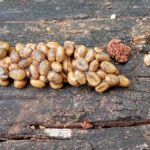
Civet scat, scat of the Asian palm civet, found on a fallen log.
| Photo Credit: Special Arrangement
A recent scientific study by researchers of the Central University of Kerala (CUK) has revealed that civet processed robusta coffee, popularly known Kopi Luwak, shows distinct difference in its fatty acid methyl esters and total fat content when compared to naturally harvested robusta beans, offering fresh scientific insight into the origins of its famed aroma and flavour.
The findings add empirical weight to long held beliefs about the unique sensory, nutritional and aromatic qualities of the civet coffee, one of the world’s expensive and exotic brews.
The research conducted by Ramit Mitra, Thomas Jose, Thomas Jose, P. Abhiram Krishnan, M. Hariraveendra, and Palatty Allesh Sinu compared civet scat-collected robusta beans with manually harvested ones from organically and conventionally managed estates across Coorg.
According to co-author Dr. Sinu, Associate Professor, Zoology department, CUK, civet coffee, primarily produced from the excreta of the Asian palm civet (Paradoxurus hermaphroditus), is made when the animal consumes ripe coffee cherries. The pulp is digested while the beans, subjected to natural fermentation inside the gut, are excreted intact and later collected for processing. The entire digestive passage takes about 12 hours before the beans are recovered, washed, and roasted
Dr. Sinu said the study area is part of the Western Ghat biodiversity hotspot and hosts three civet species – the common Asian palm civet, brown palm civet, and Malabar civet. “Our samples were primarily from the Asian palm civet, which is a least-concerned species under International Union for Conservation of Nature (IUCN). The other two species are rarely sighted,” Dr. Sinu noted. He added that the civets contribute positively to the ecosystem by dispersing seeds while producing beans of commercial value.
Excluded roasted beans
He said the research employed morphormetric and chemical analysis, excluding roasted beans to prevent heat-related degradation of compounds.
“We used gas chromatography – mass spectrometry to profile volatile and semi-volatile compounds and fatty acid methyl esters (FAMEs). About 85% of civet scats were collected from elevated areas and plantations,” he said.
Dr. Sinu said the study found that civet-processed beans were larger and contained higher fat contents than manually collected ones. FAME profiling showed elevated level of caprylic acid and capric acid methyl esters, compounds responsible for the coffee’s creamy aroma and enhanced flavour in civet-proceed beans. However, protein and caffeine levels remained similar between the two types.
The researchers concluded that the civet’s digestive and enzymatic process naturally ferment the bean, subtly altering their chemical structures and enriching their sensory profile. The fermentation is made possible with the help Gluconobacter, a genus of bacteria found to uniquely dominate the gut microbiome of civet cats. The bacteria genome has enzyme producing genes for fermentation.
Artificial civet coffee
“Once it is found which gene are responsible for enzyme production, artificial civet coffee can be made, he added.
Dr. Sinu said though the morphometric and chemical variations were moderate, the findings reinforced the long-held belief that civet digestion contributes to the distinctive taste of Kopi Luwak, which is priced between $600 and $13,000 per pound. The global market for civet coffee is projected to surpass $11 billion by 2032, with an annual growth rate of 4.43%.
Dr. Sinu said the idea for the research emerged during an interaction with breweries and coffee start-ups exploring innovative fermentation techniques. “With India’s coffee sector showing growing entrepreneurial activities, understanding civet coffee’s quality and composition could help local industries tap into global speciality coffee markets,” he said.
The scat samples were collected in November last year and analysed at CARE Kerala Laboratory, Ernakulam. The study, published recently in Scientific Reports under Nature’s Portfolio, underscores the biochemical uniqueness of civet-processed coffee and its potential significance for India’s speciality coffee industry.
Published – October 24, 2025 09:13 pm IST

